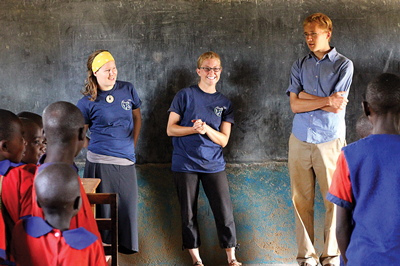Mountains & Minds: Learners and Leaders
Integration
Integrating learning, discovery, and engagement is the marquee feature of this MSU strategic plan. Traditionally, land-grant universities have educated students, conducted research and provided outreach to their communities and states. MSU has gone a step further by regularly integrating research and teaching, practicing service-learning, and combining research with outreach. With this plan, MSU now boldly defines the 21st century land-grant university as one where learning, discovery, and engagement merge seamlessly to the benefit of students, faculty, staff, and the wider community.

Goal:
By integrating learning, discovery and engagement, and by working across disciplines, the MSU community will improve the world.
All members of the MSU community will have the opportunity to transcend the boundaries between learning, discovery, and engagement. This powerful integration will set MSU apart as a fully-formed land grant institution, committed to improving the world through education, research, and outreach, and by working across disciplinary boundaries to address the complex challenges facing the future.
MSU undergraduates integrate learning and discovery through hands-on research and creative activity required in the Core 2.0 curriculum. In addition, an increasing number of service-learning courses are being offered, and the number of students enrolling in these courses has increased. Graduate students integrate learning, discovery, and engagement within their professions through internships and practica, by engaging their discipline-based communities, and through new discoveries that have a demonstrated broader impact on society. Faculty and staff integrate their work by bringing new discoveries into the classroom, students into the lab, field, and studio, knowledge from one discipline to another, and research and creative products to the wider community.
This goal pushes MSU into the forefront in bridging these missions. Through substantial curricular experiences, students will not only acquire knowledge and experiences that will improve their individual futures, but they will also positively transform the community. By working with other scholars, students, and community partners across disciplinary boundaries, faculty and staff will magnify the impact of their research and creative activities. And when outreach involves students as well as faculty and staff, the full power of the institution to change lives is realized. MSU must recognize and reward success in integration across its land grant activities and across disciplines.
Evidence:
MSU has demonstrated success in cross-disciplinary and integrated learning, discovery, and engagement:
- The Sustainable Foods and Bioenergy Systems program illustrates how, through integration, students engage with the content they learn in the classroom on a much deeper level when they participate in the operation of Townes Harvest, a community supported vegetable garden. Through the garden, students grow crops that help feed the local community, including donations to the local food bank and reduced-cost vegetables for senior citizens in nearby rural communities. The SFBS program leverages the strengths of the College of Agriculture and the College of Education, Health and Human Development, fostering interdisciplinary learning, discovery and community engagement.
- MSU’s After School Partnership with the Bozeman Public Schools and the Greater Gallatin Valley United Way enables students in the Department of Education to take what they learn in the classroom directly to the community with after-school supplementary instruction, supervised teaching, performance-driven research, and other innovative opportunities to integrate learning, discovery, and engagement.
- Montana State University’s Center for Native Health Partnerships creates community-based research projects and partnerships to improve Native American health. Projects include opportunities for Native students to conduct summer research projects on their home reservations.
